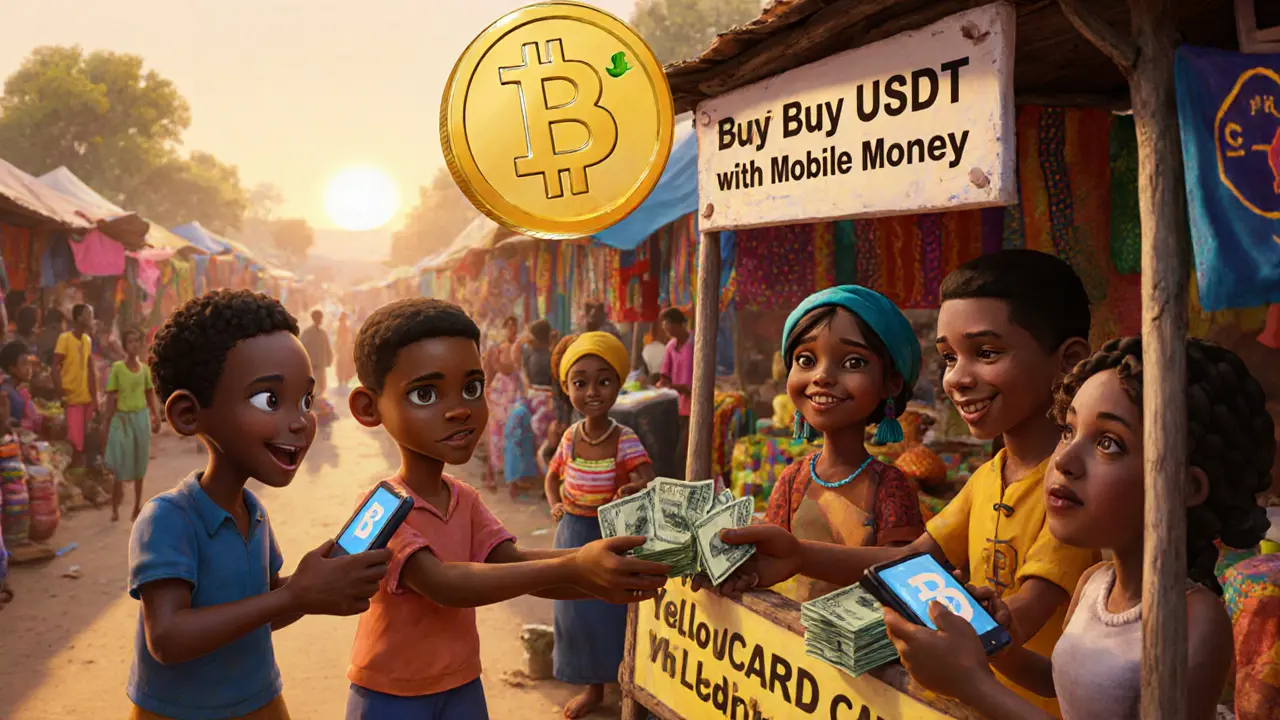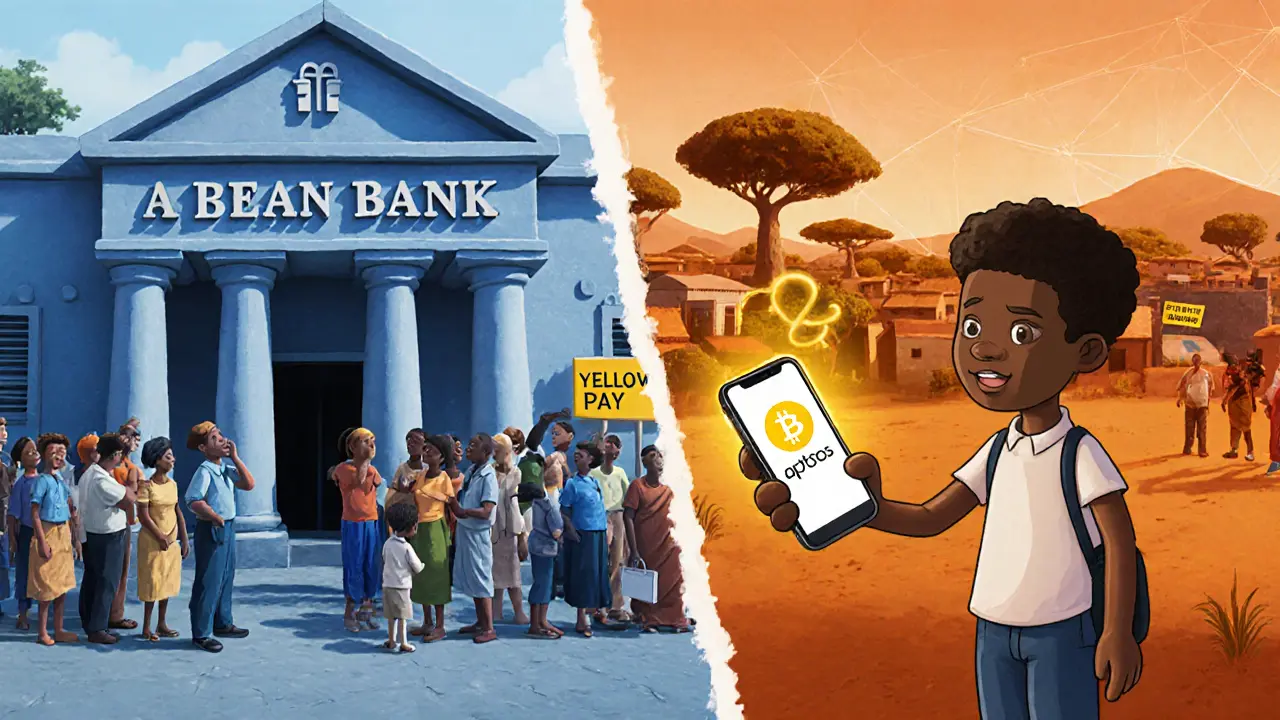YellowCard Crypto Exchange Review: Africa's Leading Platform for Stablecoins and Local Payments
 Jun, 30 2025
Jun, 30 2025
YellowCard Fee Calculator
Calculate Your Transaction Costs
Compare YellowCard fees with traditional banking in Africa
YellowCard Fee
$0.00
Traditional Banking Fee
$0.00
Why YellowCard is Cheaper
In Africa, traditional banks charge 15-20% for foreign exchange transactions. YellowCard's fees range from 0.5% to 1.5% for mobile money deposits and 0.8% for bank withdrawals.
What Is YellowCard and Why Does It Matter in Africa?
YellowCard isn’t just another crypto exchange. It’s a financial bridge built for Africa’s unbanked. Founded in 2017 by Chris Maurice and Justin Poiroux, it started with Bitcoin sales out of a Taco Bell in Alabama, but quickly pivoted to solving real problems on the ground in Africa. Today, it operates in 22 African countries, serving over 350 million people who lack access to traditional banking. In Nigeria alone, where the naira has lost over 40% of its value against the dollar since 2022, YellowCard lets users buy Bitcoin, USDT, and USDC with mobile money, bank transfers, or cash at over 36,000 local agents.
Unlike global exchanges like Binance that treat Africa as just another market, YellowCard built its entire system around African payment habits. It doesn’t force users to use credit cards or wire transfers. Instead, it connects directly with MTN Mobile Money, Airtel Money, Paga, and local banks. That’s why, according to Chainalysis, YellowCard handles 78% of all crypto transactions in Nigeria - more than any other platform.
How YellowCard Works: Simple, Fast, Local
Getting started takes less than five minutes. You sign up with your name, email, and phone number. No complicated forms. Then you choose how to fund your account. In Nigeria, you can deposit cash at a nearby pharmacy or kiosk. In Ghana, you use MTN Mobile Money. In Kenya, it’s M-Pesa. Once funded, you instantly buy Bitcoin, Ethereum, USDT, or USDC at live prices. No waiting for bank approvals. No hidden delays.
The app is lightweight and works even on low-end Android phones - which is critical since 89% of users access YellowCard via mobile, according to Statista. The interface is clean: one screen to buy, one to sell, one to send. There’s no overwhelming list of 300 coins. YellowCard keeps it focused: 15 major cryptocurrencies, mostly stablecoins and top-tier assets. That’s intentional. Most African users aren’t trading altcoins. They’re using USDT to protect savings from inflation or send money home.
Fees: Lower Than Banks, Higher Than Global Exchanges
YellowCard’s fees vary by country and payment method. In Nigeria, buying Bitcoin with mobile money costs 0.5% to 1.5%. That’s far better than Nigerian banks, which charge 15-20% for foreign exchange. Compared to Binance’s 0.1% spot fee, YellowCard’s rates are higher - but that’s because it’s covering the cost of cash pickup points, mobile money integrations, and local compliance.
Here’s the real win: Yellow Pay. This feature lets you send USDT or USDC to anyone in a YellowCard country using just their phone number. No wallet addresses. No QR codes. No fees. In October 2025, a user in Nairobi sent 5,000 KES ($38.50) to a relative in Lusaka. The transfer completed in two minutes. That’s faster and cheaper than Western Union or MoneyGram.
For withdrawals, fees are minimal. Selling crypto to your bank account in South Africa costs 0.8%. In Ghana, cash withdrawal via mobile money is free for amounts under 1,000 GHS. The platform even sponsors gas fees on the Aptos blockchain for USDT and USDC transfers - meaning you get instant settlement with zero network fees, unlike Ethereum-based platforms where fees can spike to $10 during congestion.

Security: Multi-Signature Wallets and Local Compliance
YellowCard doesn’t store all your crypto on hot wallets. It uses multi-signature wallets, meaning multiple approvals are needed to move funds - a standard practice for serious platforms. Your private keys are never exposed. The company also holds operational licenses in South Africa and Botswana and is actively seeking approval under Ghana’s new Virtual Asset Service Providers law.
But security isn’t just about tech. It’s about trust. YellowCard works with local regulators and complies with each country’s KYC rules. In Nigeria, you need your Bank Verification Number (BVN). In South Africa, you upload your ID card. In Kenya, you verify your phone number through the telecom provider. These steps take time - sometimes longer than promised. About 23% of complaints on Consumer Affairs mention ID verification delays beyond 24 hours. But once approved, your account stays active.
Pros and Cons: Is YellowCard Right for You?
Pros:
- Best-in-class integration with African mobile money and cash networks
- Zero-fee peer-to-peer transfers via Yellow Pay across 22 countries
- Instant USDT/USDC settlements thanks to Aptos blockchain integration
- Lowest fees for buying crypto with local currency in Nigeria, Ghana, and Kenya
- Supports English, French, and Portuguese - key for regional users
- Backed by $50M Series B funding from Blockchain Capital (March 2025)
Cons:
- Only available in Africa - no global access
- Only 15 cryptocurrencies, compared to Binance’s 350+
- No 24/7 customer support - Help Center operates 8 AM to 8 PM GMT
- Withdrawal delays reported in Uganda and Tanzania during high-volume periods
- Limited educational content for beginners - no interactive tutorials or glossaries
How YellowCard Compares to Binance, Paxful, and Luno
Let’s cut through the noise. If you’re in Nigeria and want to buy crypto with your phone balance, YellowCard is the clear winner. Binance doesn’t support mobile money in most African countries. Paxful is peer-to-peer - risky and slow. Luno is great in South Africa but doesn’t offer cash deposits in Uganda or Cameroon.
| Feature | YellowCard | Binance | Paxful |
|---|---|---|---|
| Available in Africa | 22 countries | 180+ countries | 160+ countries |
| Mobile money support | Yes - MTN, Airtel, M-Pesa, etc. | No | Partial - only in select countries |
| Cash deposit locations | 36,000+ in Nigeria alone | None | None |
| Stablecoin transfers | Zero fee, instant (Aptos) | Standard Ethereum fees | Variable, often high |
| Best for | Buying crypto with local cash or mobile money | Trading altcoins, advanced users | Peer-to-peer trades with high risk |
YellowCard wins on accessibility. Binance wins on choice. Paxful wins on anonymity - but at the cost of safety. If you’re new to crypto in Africa, YellowCard removes the friction. If you’re a trader chasing memecoins, look elsewhere.

User Experience: Real Stories from the Ground
On Trustpilot, YellowCard has a 4.1/5 rating from over 1,200 reviews. Nigerian users rave about the 30-second verification. One wrote: “I bought $100 worth of USDT with my MTN balance. My sister in Ghana got it in 90 seconds. No fees. No drama.”
But not everyone has a smooth ride. Ugandan users on Reddit reported withdrawal delays up to 72 hours during peak times. Some say the app crashes when loading large transaction histories. Customer support responds in under 12 hours for 87% of tickets - but only during business hours. If you need help at midnight, you’re out of luck.
The biggest pain point? Verification delays. While YellowCard promises 24-hour ID checks, many users report waiting 2-4 days, especially if they’re using older IDs or non-standard documents. That’s frustrating when you’re trying to hedge against currency collapse.
What’s Next for YellowCard?
YellowCard isn’t standing still. In May 2025, it integrated with Ghana’s National Identification System to cut verification time by 60%. In June, it expanded into Senegal and Mauritius. Its roadmap includes launching a DeFi portal by Q1 2026 - letting users stake USDT and earn yield, something no other African-focused exchange offers.
Deloitte Africa predicts platforms like YellowCard will handle 45% of all cross-border remittances in Africa by 2027. That’s $4.2 billion in savings for users who currently pay exorbitant fees to Western Union or MoneyGram. With $50 million in new funding and regulatory progress in Ghana and South Africa, YellowCard is positioned to become Africa’s financial backbone - not just a crypto app.
Final Verdict: Who Should Use YellowCard?
If you live in Nigeria, Ghana, Kenya, Uganda, or any of the 22 countries YellowCard serves - and you want to buy crypto with cash, mobile money, or bank transfer - this is the best option. It’s faster, cheaper, and more reliable than anything else in the region.
If you’re outside Africa, or you want to trade Solana, Shiba Inu, or 200 other coins - skip it. Use Binance or Kraken.
YellowCard isn’t trying to be everything. It’s trying to be everything for Africa. And in that mission, it’s winning.
Evelyn Gu
November 27, 2025 AT 00:07Okay, I just spent 45 minutes reading this whole thing because I’m obsessed with fintech in emerging markets, and wow-YellowCard is actually kind of amazing? Like, I’ve used Binance for years, but the idea of buying crypto with mobile money? In Nigeria? That’s not just convenient-it’s revolutionary. I can’t even imagine how many people this is helping who’ve been locked out of the global economy because they don’t have a bank account or a credit card. And the fact that they’re using Aptos for zero-fee USDT transfers? Genius. Why hasn’t anyone else done this? It’s like they looked at Africa’s real infrastructure and built around it instead of forcing a Western model on it. I’m genuinely impressed.
Michael Fitzgibbon
November 27, 2025 AT 19:42There’s something quietly powerful about a company that doesn’t try to change how people live, but instead meets them where they are. YellowCard isn’t selling a crypto fantasy-it’s selling reliability. In places where inflation eats savings like termites, having a way to preserve value without needing a passport or a SWIFT code? That’s dignity. And the fact they’re working with local regulators instead of fighting them? That’s the opposite of the usual crypto arrogance. It’s not flashy, but it’s the kind of innovation that lasts. I hope more platforms follow this model-not because it’s trendy, but because it’s right.
Komal Choudhary
November 28, 2025 AT 06:59OMG I just tried signing up on YellowCard from India and it didn’t work 😭 I live in Bangalore and I’ve been trying to send money to my cousin in Ghana for months and this would’ve been perfect! Why is it only for Africa?? That’s so unfair!! I literally just opened an MTN account on my phone and now I’m mad it doesn’t work here!! Can’t they just add India?? I’ll even pay extra!!
Sierra Myers
November 30, 2025 AT 00:41Let’s be real-this is just Binance Lite with a side of cash pickup points. Yes, mobile money integration is cool, but 1.5% fees? That’s a ripoff if you’re buying more than $500. And Aptos? That’s a blockchain nobody’s heard of outside crypto circles. They’re not innovating-they’re packaging existing tech with a ‘for Africa’ sticker and charging more because they know people have no other choice. Also, ‘zero fees’ on Yellow Pay? That’s only true if you’re sending to another YellowCard user. If you want to move it to a wallet? Suddenly there’s a gas fee. Classic bait-and-switch. Don’t get fooled by the feel-good narrative.
Puspendu Roy Karmakar
November 30, 2025 AT 21:54I live in Lagos and I’ve been using YellowCard since 2021. When the naira crashed, I lost my job and my savings were evaporating. I bought my first $50 in USDT with my phone balance at a corner shop. That was the day I stopped panicking. The app isn’t perfect-it crashes sometimes, and verification took me 3 days because my ID photo was blurry-but it saved me. I send money to my sister in Accra every week. No fees. No waiting. Just send and done. I don’t care if it’s not Binance. I care that it works when I need it. This isn’t a crypto app. It’s a lifeline.
imoleayo adebiyi
December 1, 2025 AT 22:02Sierra Myers, you’re missing the point. Fees are higher because YellowCard pays drivers to pick up cash from kiosks, trains agents, and complies with local laws. Binance doesn’t do any of that. They just take your card and vanish. Also, Aptos isn’t ‘nobody’s heard of’-it’s the fastest growing blockchain for stablecoins in emerging markets. And yes, the verification takes time, but so does opening a bank account in Nigeria. At least YellowCard doesn’t ask for your birth certificate and your uncle’s tax return. This platform is saving lives. If you can’t see that, you’re not looking at the right map.